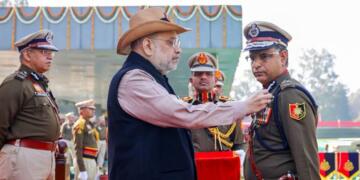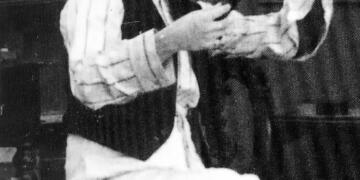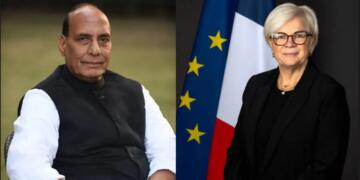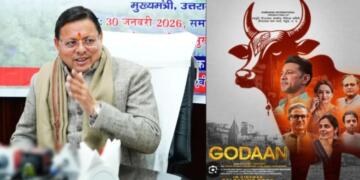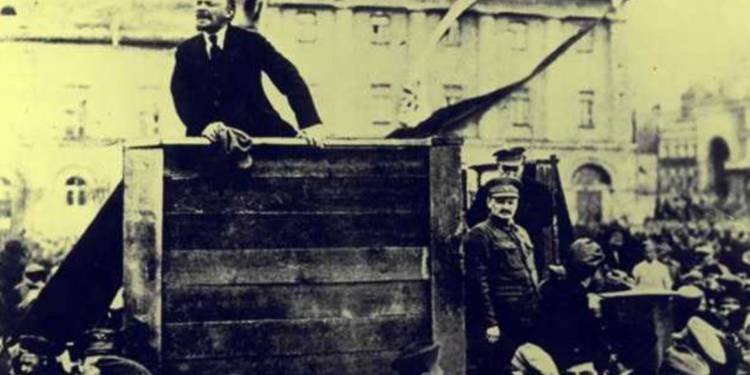On July 16, 1918 Nicholas Romanov, the czar of Russia, and his family were awakened in the middle of the night by the Bolsheviks. The red soldiers guided the family into the basement of the house where they were being held. Once all members were assembled, a death sentence was read aloud by the revolutionaries and the eight executioners raised their guns with the barrel pointed towards the family. It was just for few moments that the house echoed with the screams of children. No member of the Romanov family could escape their tragic fate. But what was behind it?
It was the Russian Revolution under the leadership of Lenin. The year of 1917 was that changed the course of Russian history.
Two revolutions happened that year. The first was February revolution that overthrew the imperial government and the second was October revolution that placed the Bolsheviks in power.
On March 7, due to wage dispute an industrial plant in Russia shut down leaving many laborers unemployed. Within the next few days numerous riots broke out due to anti-government sentiments among the masses. Food shortages and street demonstrations exacerbated the situation. As days passed, more and more people joined the rioters and the government gave orders to the military to crush the dissent. Then came the turning point of the ordeal. The Army gave orders to shoot the rioters. However, some soldiers did not have the heart to shoot their brothers as it was against their moral stand. Instead, they decided to join the strikes and the army lost its control of the situation.
With the swelling ranks of the dissenters the remaining soldiers were forced to go into hiding in order to protect themselves from the wrath of the angry protesters. With no military backing, Czar Nicholas II abdicated the throne and a provisional Government was set up in its place. This provisional government consisted of bankers, lawyers, industrialists, and above all capitalists. It was very weak and failed to deliver on its promises. This paved the way for the Bolsheviks to push themselves into power during another revolution in October 1917.
It was period of World War I. Germany devised a plan to eliminate the Russian threat once and for all. Their weapon was a man. The German government secretly arranged safe-passage for Vladimir Lenin to return to Moscow. Moreover, they financed him through 1918 with the hope that he would start a revolution that would cause Russia to withdraw its war with Germany. When Lenin came back from exile in the spring of 1917, he joined the Bolshevik Party in Russia whose goal was to overthrow the Provisional Government and set up a government for the proletariat.
The soldiers and the peasants asked the provincial government for land. When the Provincial government refused to distribute the land fairly, then the peasants revolted. The Bolshevik party saw an opportunity and tried to seize it by brainwashing the workers and soldiers, convincing them to seize power and land for themselves. In early October, Lenin urged the Bolshevik Party to make an immediate assault against the Provisional Government. The armed workers known as Red Guards stormed the winter palace. Once the winter palace was taken Vladimir Lenin announced his vision to construct a socialist society in Russia. Thus, communist regime was established.
When the revolution was occurring in Russia the world had its eyes on it. Many people in the west were captivated by the communist ideology. They regarded “The Communist Manifesto” as their bible. Jack Reed was one such man who was such a firm believer of communism that when Russia was in turmoil in 1917, he left USA to witness the firsthand account of the revolution. Reed was an enthusiastic supporter of the new socialist government that he got a job at the Foreign Affairs office of USSR. He met Leon Trotsky and was introduced to Lenin who made him believe in the “Socialist” utopia. But not everyone in USSR bought that.
People like acclaimed writer Ayn Rand (the author of The Fountainhead and Atlas Shrugged) left USSR for USA and never returned. After the revolution her father’s business was taken over by the Bolsheviks. They had sanctions imposed on them. The vicissitude of the Rand family changed completely and they had to live in poverty which forced Rand to flee USSR. She was not alone who did not believe in the Communism. Many who believed in Socialism or Communism abandoned it when the reality struck them in the face.
Communism began as an ideology with Karl Marx at helm eventually got destroyed by Stalin. Estimates on the number of deaths during Stalin’s rule are widely debated by scholars in the field of communist studies but on wide parameters the death toll is as high as 60 million.
The fire of communism spread throughout the world after World War 2. After the Cuban revolution Fidel Castro called it a Socialist revolution. His regime executed as many as 1.4 million people without fair trial. Mao transformed China into a communist state after killing 45 million people. North Korea under the influence of USSR established itself as a communist state after Korean War. The communist regime of Pol Pot executed around 2.5 million in Cambodia. Venezuelan government calls itself a socialist government but make no mistake of differentiation between communism and socialism. Today, its facing one of the worst economic and political crisis.
According to Rand “There is no difference between communism and socialism, except in the means of achieving the same ultimate end: communism proposes to enslave men by force, socialism—by vote. It is merely the difference between murder and suicide”.
But why did the intelligentsia (intellectuals not pseudo-liberals) fell into the swamp of communism ignoring multiple warning signs on the way? ‘The God That Failed’ is a book that provides some of the reasons. It is collection of six renowned writers Arthur Koestler, Ignazio Silone, Richard Wright, Andre Zide, Louis Fischer and Stephen Spender who became ‘Comrades’ in search of the Utopian world it promised. When they realized it was all a sham they renounced communism.
According to Crossman, people chose Communism because they had lost faith in democracy and were willing to make sacrifices in order to defeat imperialism. The failure of the the right to recognize the dangers posed by the rise of Fascism enhanced the appeal of the communists who were the only ones to confront it, besides presenting the grand dream of the proletarian revolution. On the one hand was the dream and on the other a nightmare. People chose nightmare dressed in daydream.
Ignazio Silone joined the Proletarian Revolution not just to get associated up with a political organization. He was completely dedicated to bring a change in society. Like most of the Marxists he was aghast by the injustices he saw in the Italy that convinced him to join communist organizations. Andre Gide was attracted by what he thought the Soviet Union that for him was Utopia in making. Louis Fischer was fascinated by the global appeal of the revolution. At that time communism not only proposed better Russia but a better world.
World-wide abolition of war, poverty and suffering was the vision of communists. That’s why the labor class felt that something important had taken place in their lives when the revolution took place in Russia. “Workers of the world, Unite!” was the punch line to spread communism in other parts of the world.
But soon they all got disillusioned after their exposure to the conditions within Russia. The poverty of peasants got worse while Communist Party leaders lived in luxury and indulged in corruption. There was no free press and the only newspaper “Pravda” the communist party mouthpiece had the highest circulation of all. A common saying in Soviet Union was ‘there is no truth in Pravda’. The irony is Pravda in Russian means truth.
In communist countries there was no space for any alternative vision.
Not only this Stalin’s purges, kangaroo courts, exile to prison camps (Gulag, infamous of all) and the mass execution of dedicated party members hammered the final nail to coffin of the communist ideals. Following this many intellectuals gave up the communist party membership in their respective countries.
2017 marks the centenary year of the revolution. The impact of Communism in the world has rapidly declined after the dissolution of USSR. However, the ideology continues to corrupt the mind of the youth. One example is of the outlawed Communist Party of India (Maoists) which believe in armed revolution overthrow the government. Its members are Naxalites who follow the path of Mao. This year also marks the 50 years of Naxalism in India.
One thing is common with the Russian revolution and Naxal movement that both movements deviated from their original path and resulted in more oppression which they claimed to fight.
Politically, CPI-M (Marxist) which ruled West Bengal for more than 30 years destroyed it completely. Kerala too is not God’s own country anymore. The communist are indulged in killing ‘swayamsewaks’ to instill fear in society. It’s the fear on which they feed upon to rule so that there is no space for any alternative voice that opposes them. This is how Stalin ruled USSR by killing his opponents. One example is Trotsky who was assassinated by the USSR secret service on orders of Stalin.
In India the influence of communist party is restricted to a few states only but continues to be a force to be reckoned with. The damage it did to the educational institutes of this country is irreparable. Long back, Ayn Rand once said “The Communists’ chief purpose is to destroy every form of independence—independent work, independent action, independent property, independent thought, an independent mind, or an independent man. Conformity, alikeness, servility, submission and obedience are necessary to establish a Communist slave-state”.
They have failed over it and it’s our duty to never let them succeed. The ‘intellectual kshatriya’ must win the war.



